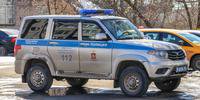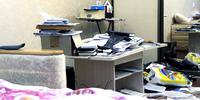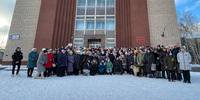The Case of Mavrin and Others in Balakovo
- #
The Saratov Expert Bureau carries out a psychological, linguistic and religious study of the conversations of believers from Balakovo at the request of the FSB Directorate for the Saratov Region.
- #
Senior investigator of the Investigation Department of the FSB of Russia in the Saratov region A. Prydatko initiates a criminal case against unidentified persons for organizing extremist activities and participating in them.
- #
The Frunzensky District Court of Saratov authorizes searches at 8 addresses of Jehovah's Witnesses living in Balakovo.
- #
In the evening in Balakovo, FSB officers, the National Guard and SOBR fighters conduct hours of searches that affect 14 Jehovah's Witnesses, including the elderly and disabled.
According to the victims, the security forces generally behave politely. Some believers are offered to cooperate with the investigation.
The security forces claim that they are looking for "weapons, drugs and prohibited literature." They seize electronic devices, personal records and postcards, and some have Bibles and religious books. Also, the phone was seized from a relative of believers who is not Jehovah's Witness.
The security forces come to the Murych family at 11 p.m. They also search the children's room, which is why the young child cannot sleep.
After interrogations, which end after midnight, Aleksey Bogatov, Vladimir Mavrin, Yevgeniy Fomashin, Andrey Murych and Sergey Tyurin are sent to the temporary detention facility.
- #
Investigator Prydatko prosecutes believers as accused.
- #
The court chooses Mavrin, Bogatova, Fomashin, Murych and Tyurin a measure of restraint in the form of detention for a period of 2 months. They are placed in pre-trial detention center No. 1 in the Saratov region.
- #
Five of the accused are included in the list of extremists of Rosfinmonitoring.
- #
- #
The Frunzensky District Court of Saratov releases believers from custody. Sergey Tyurin, Yevgeny Fomashin, Vladimir Mavrin, Andrey Murych and Alexei Bogatov spent 10 months in the pre-trial detention center.
The current measure of restraint is the prohibition of certain actions. Believers should not leave the city of Balakovo, send or receive postal and telegraph items, use communications and the Internet, as well as violate other restrictions.
- #
The case goes to the Balakovsky District Court of the Saratov Region. It will be considered by Natalia Nikitinskaya.
- #
The hearings on the case of five believers begin. To support the defendants, 80 people come to the courtroom, of whom 17 are allowed inside, mostly relatives.
Judge Nikitinskaya leaves unsatisfied the defendants' petition to refuse lawyers by appointment.
The defense asks to change the measure of restraint for men - from a ban on certain actions to a written undertaking not to leave. Believers justify this by the need to care for relatives living in the Saratov region. The court refuses.
- #
Yevgeny Fomashin, submits documents on the presence of his chronic diseases.
Prosecutor Andrei Nazarkin reads out the charges. The defendants express their attitude to the prosecution - they do not admit guilt.
The court rejects the request to return the case to the prosecutor.
- #
The prosecutor asks for the testimony of witnesses who did not appear in court.
Alexei Bogatov opposes the disclosure of the testimony of FSB officer Ryabov and Interior Ministry officer Skorobogatov, who searched him. According to their testimonies, the seized items allegedly confirm his extremist activities, while the search report does not say anything of the kind. The court agrees with the position of the believer.
- #
Four witnesses are being questioned.
The first of them learned that Fomashin's was a Jehovah's Witness only during interrogation by the FSB. Another witness has long known the defendant Bogatov and speaks positively of him.
Counsel emphasizes that all the defendants served either in military service or in alternative civilian service. This indicates that they have never opposed the constitutional order.
- #
The questioning of witnesses is ongoing. One of them replies that of those present she knows only Andrei Murych, does not feel hostility towards him, characterizes him as a calm and non-conflict person.
During the interrogation, a relative of Vladimir Mavrin speaks positively of him.
A witness is being interrogated - a disabled person of group II, who is registered in a neuropsychiatric dispensary. She gives contradictory testimony.
FSB officer Ryabov, who participated in the search of Alexei Bogatov's home, reports that he used technical means for covert surveillance to collect information. When asked what signs of extremism were found in the actions of the defendants, he answers: "I can't explain, a lot of time has passed, I have compiled many reports." And when asked what methods of conspiracy the defendants used, he answers: "They drew the curtains."
At the request of the state prosecutor, E. M. Ivanov is interrogated as an expert. He says that Jehovah's Witnesses strictly adhere to the position of political neutrality, in their publications he did not meet calls for the disarmament of the Russian army or undermining the foundations of the state. Speaking about the history of Jehovah's Witnesses in Russia and the USSR, Ivanov notes that persecution of believers took place before and that there were no retaliatory actions on their part. According to him, Jehovah's Witnesses are consistent pacifists.
- #
The chairman of the homeowners' association is being questioned. She says that none of the neighbors complained about the family of Sergei Tyurin. She calls the Tyurins peaceful and calm. She also emphasizes that Sergey never agitated her to join the ranks of Jehovah's Witnesses.
- #
The court reads out the materials of the case. Aleksey Bogatov draws the court's attention to the fact that at liturgical meetings believers "learn not to envy each other, but to show love for their neighbors."
He also notes that Jehovah's Witnesses do not impose their beliefs, do not force people to study the Bible, respect freedom of choice and the right to privacy.
Bogatov emphasizes that none of the announced recordings revealed any extremist appeals - on the contrary, the listeners were encouraged to love and good deeds.
- #
The written materials of the case are examined and information about the basic beliefs of Jehovah's Witnesses is read out. The defendants are being interrogated.
Andrey Murych notes in his testimony that many believers try to help each other financially. This was especially noticeable during the pandemic, as some could not afford to buy medicines. He makes observations that the books and publications seized during the search of his house are not included in the list of extremist ones, that the activities of Jehovah's Witnesses have never been associated with violence and that if they had behaved aggressively, there would not be so many of them around the world.
Sergey Tyurin points out that the case file does not contain any facts that are somehow related to extremist activities. He explains that extremism is inextricably linked to the use of violence, and there is not a word in the case file about threats or calls for the use of violence.
Alexei Bogatov explains that Christian worship meetings are the exact opposite of extremist activity, as they encourage love and good deeds and do not even hint of violence, discrimination, changing the constitutional order or elevating one religious denomination over another. He adds that in their meetings, Jehovah's Witnesses teach the same thing as Jesus Christ, who said: "Do not cease to love your enemies and pray for those who persecute you."
Vladimir Mavrin declares: "Professing the religion of Jehovah's Witnesses is incompatible with any form of extremism. If anyone even conceived any criminal actions aimed at undermining the constitutional order, causing any harm to the state, society, individuals or their property, this would be contrary to religious beliefs and such a person could not be called a Jehovah's Witness."
Yevgeny Fomashin: "The court examined the materials of the case, and there is not even a hint of any extremism in them, and there cannot be." He adds: "There were worship services, the biblical text, the laws, principles and commandments of God were discussed."
Yevgeniy submits a petition for the inspection of his laptop, since the screenshot of the main screen attached to the case is different from what he had before his arrest. Despite the prosecutor's objection, the judge allows Fomashin at the next hearing to inspect his computer in person, without the involvement of a specialist.
A certificate from the pension fund is attached to the case stating that Mavrin takes care of elderly relatives.
- #
Material evidence is being examined. During the inspection of Fomashin's laptop, it turns out that changes have been made to it and its contents do not correspond to what they were before the searches. And in Murych's laptop after the search, an application of Jehovah's Witnesses appeared.
The court hears audio recordings of one of the services. The defendants confirm that the voice of the presenter does not belong to any of them.
The defendants Murych and Tyurin file a number of petitions, including the attachment of certificates from the place of work and production characteristics to the case file.
- #
The prosecutor is requesting 7 years in prison for Vladimir Mavrin and Alexei Bogatov and 3 years for
Andrey Murych, Evgeny Fomashin and Sergey Tyurin.
- #
The last word of the defendant Alexei Bogatov in Balakovo The last word of the defendant Vladimir Mavrin in Balakovo Andrey Murych's last word in Balakovo The last word of the defendant Sergei Tyurin in Balakovo The last word of the defendant Yevgeny Fomashin in Balakovo - #


